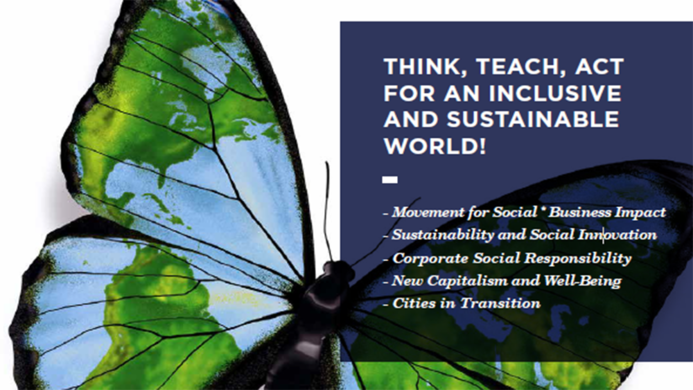During this historical moment of transition to a more sustainable world, HEC Paris has a responsibility to help business stakeholders transform the challenges around this transition into opportunities – opportunities to maximize both economic and social value, notably by being more innovative and impactful. It is time to revisit existing organizational theories and rethink the way we teach business in terms of social utility.
HEC Paris began to explore questions around social utility with the introduction of its first Master’s programs in CSR in 2000. Then, in 2008, Professor Rodolphe Durand founded the Society & Organizations Institute (S&O Institute). The S&O Institute focuses on the relationship between organizations (mainly firms) and society – a relationship that will become only more important as the global shift towards sustainability gains momentum. Hence the strategic importance of the S&O Institute to HEC Paris. Its 3 pillars of research, education, and action give rise to our Institute's motto: Think, Teach, Act for an inclusive and sustainable world! This special issue reflects the S&O Institute’s triple orientation by exploring specific examples of our activities.
We start at the beginning with our commitment to train change-makers and leaders in responsible, sustainable management and thereby facilitate their leadership of business and society’s global transformation. To achieve this goal, we develop innovative teaching methods across several programs at HEC Paris. For example, the Master’s in Sustainability and Social Innovation is one of our Institute’s flagship programs, designed in particular for young strategists and social entrepreneurs / intrapreneurs.
Next, we focus on one of the S&O Institute’s strongest pillars: our research. Since the creation of the Institute, its founder Rodolphe Durand has gathered numerous researchers from different disciplines to create a vibrant place for shared reflection. They are proudly contributing to the development of an international research community focused on contemporary challenges. In this special issue, we focus on 3 of the research topics recently undertaken at the Center. Rodolphe Durand explores why and how firms respond to demands for social responsibility. Arnaud Van Waeyenberge and David Restrepo-Amariles, both researchers and lawyers, show that CSR increasingly operates as a genuine normative system and can even stand in for the law. Last but not least, Olivier Chatain and PhD student Elena Plakenskova demonstrate how NGOs and commercial firms can benefit from better partnerships.
We then present the S&O Institute’s annual on-campus conference, which invites academics, students, managers and practitioners, and government representatives to reflect together on solutions for a more sustainable, inclusive economy. This year, the event, entitled “Alliances for Cities in Transition” focused on multi-actor initiatives for building tomorrow’s more sustainable, inclusive, and resilient cities.
We are also very happy to present our new initiative undertaken in partnership with 5 large corporations who all share the same objective: to put social utility at the heart of their corporate strategy. Called the Movement for Social * Business Impact, it aims to facilitate a more inclusive economy in which companies maximize both their social impact and their performance.
In “Measuring the Impact of Business on Well-being,” Rodolphe Durand concludes the issue by explaining our work in collaboration with the OECD to define new performance indicators in order to shape a new form of capitalism.Finally, I invite each of you — students, alumni, managers, citizens, leaders, politicians, journalists, and influencers — to contribute to the current transition towards a more inclusive, sustainable economy, where economic impact and social impact go together. Given the salience and urgency of today’s challenge, we need a global mobilization, where everyone stands up to become actors with purpose.
Are you up to the challenge?







